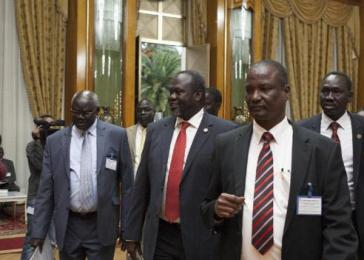Rebels accuse IGAD mediators of bias as talks adjourned
August 27, 2014 (ADDIS ABABA) – South Sudan’s armed faction of the Sudan People’s Liberation Movement (SPLM in Opposition) led by the former vice-president Riek Machar has sharply criticised the Intergovernmental Authority on Development (IGAD) for what they said was its bias towards president Salva Kiir in the peace process which the regional bloc has been mediating for the past eight months.

They also proposed that the Machar-led rebel group would nominate somebody to fill a new would-be prime minister’s position, but the official occupying this position will not be eligible for elections.
The regional bloc further gives a 45-day ultimatum within which the two parties should work out details of the peace agreement.
Six heads of state and representatives of government including president Salva Kiir inked the document in the 27th extraordinary summit on 24 August. The opposition leader Machar declined to sign it, saying the document needed further study and should have been negotiated directly by the two warring parties.
In a press statement seen by Sudan Tribune issued on Wednesday and signed by the rebels chief negotiator, Gen Taban Deng Gai, they said IGAD’s approach was biasedly in favour of president Kiir, saying the imposed document threatened to water down achievements made so far by the thematic committees from both sides of the conflict.
SALVA KIIR NOT LEGITIMATE
The rebels criticized the IGAD leaders for not doing enough to address the root causes of the conflict and instead approved president Kiir who allegedly massacred thousands of the people who elected him.
The statement challenged IGAD mediators, saying Kiir is a “symbol of genocide” in South Sudan accusing him of “killing over 20,000 ethnic Nuer unarmed civilians.”
The statement further accused the regional leaders of “double standard” insinuating that they failed to see the point maybe in fear of setting precedence given some similarities in their own countries and preferred to protect “a dictator”.
“We want to refresh the mediators’ memory of the situation in Ukraine, when the elected president Victor Yanukovych was forced out of office because his government slaughtered over two hundred unarmed protesters,” the statement said.
“Does this not amount to double standards or are our regional leaders protecting their backs,” reads the statement.”
RUSHED DOCUMENT
The statement from the SPLM in Opposition further explained that the two warring parties were working on issues of governance, security arrangements and wealth sharing when the IGAD came in with the “smuggled in document”.
They also criticised the African regional leaders for making uninformed decisions from influence outside the IGAD forum, saying the protocol which they imposed on the parties was “doctored” somewhere.
“The IGAD mediators shelved this progress achieved and smuggled in a document doctored somewhere outside the forum. This smuggled in foreign document is creating confusion and mistrust between the envoys and the parties,” reads the statement.
The press statement also observed a situation in which there was confusion on how the document was handled for signatures by the heads of state and government.
The rebels said IGAD initially agreed to give more time to the two warring parties to study the protocol, but later the regional leaders rushed to sign the text under unclear circumstances.
While the heads of state and government decided to append their signatures to the document as a guideline, the two principals in the conflict declined, asking for more time to negotiate the document, it said.
The rebels chief negotiator in the statement said IGAD confused the two roles of president Kiir as head of state and principal in the conflict.
He said it was not clear whether Kiir signed as head of state or principal in the conflict. While the other regional leaders signed on all the pages, president Kiir was only given the last page to sign on, the statement pointed out.
MACHAR DIDN’T SIGN
When one of the IGAD envoys approached the rebel leader with only the last page of the protocol document to sign it, Machar insisted that he wanted to see the whole text before he could decide, asking “Why do I have to sign a blank cheque?”
“Please bring the text,” to which the envoy replied, “sorry, you were not supposed to sign.
“This explains why Salva Kiir’s initials do not appear on the other pages of the protocol document,” the statement said.
However, rebels said that despite what they observed to be failure on IGAD to address the root causes of the conflict, they reiterated their commitment to the peace process and called on the regional and international communities to appreciate their position in respect of the protocol document.
The statement also calls for continued of the peace talks in order to negotiate a peace agreement.
TALKS ADJOURNED
Meanwhile, IGAD mediators have adjourned the peace talks for three weeks to make consultations with stakeholders.
The talks are expected to resume on 14 September amid a new 45-day deadline imposed on the two parties to reach an agreement.
(ST)

